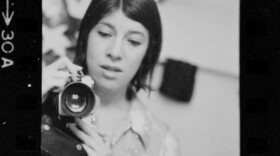The coronavirus pandemic is in some ways an echo of our history. People have compared it to other health crises, like the 1918 Spanish flu epidemic. Others have compared concerns about an economic downturn to what happened during the Great Depression.
For essayist Aleta Chossek, these parallels were born out in letters from her grandfather, a business owner who lived through the Depression:
“We have been having bad times here in America, but we have managed, so far."
“There are 12-13 million good laborers unemployed.”
“During the past years the entire government has been badly governed.”
“I think it will take a long time to get the country back on an even keel.”
The words jump off the page as I read the letter my grandfather wrote home to his brother in Norway, in September of 1933. I am struck by the parallel of his thoughts then, with an America drowning in reports of how the COVID-19 pandemic is ravaging our health care system and our economic engines. I re-read his letter with new eyes.
Since Safer-at-Home was declared, I spend much of my time connecting with people I would ordinarily see when socializing, exercising, worshiping, and volunteering. My husband and I follow closely the well-being of our families who are working and going to school from home. I have become more adept at social media tools. Life goes on and yet somehow we are mentally exhausted at the end of the day. Why is that?
Is it the constant reports of numbers of confirmed cases and deaths from COVID-19? Is it the unending “he said, she said” from governmental leaders wearing me down?
My heart breaks seeing images of exhausted and poorly equipped health care workers. Why is it so heavy for me? It’s not my family.
Maybe it’s the woman I know whose husband died from COVID-19 or the friends whose nurse daughter wears garbage bags taped together because her hospital has run out of gowns, or the distraught church member’s cries over a relative who has died without the comfort of family, or the toddler grandson who cannot understand that the image of his birthday cake is too far away to actually eat.
When my grandfather wrote “we have managed, so far,” as he did frequently in his long letter, was he whistling in the dark or was he confident, so far?
My grandfather could recite the ways in which his world had changed, how much money and land he had lost. But he could also see he had a responsibility to use what resources he had as well. He went on to write of the employee that he will keep on as long as he can, of supporting his family here, concern for his distant family in Norway.
He gave a local family with an unemployed dad $5 a week from his reduced earnings because he cannot in his words, “let them starve.”
Even though our world has shrunk to our homes and neighborhoods. We can both see and talk to people around the globe. But that does not mean we know how to cope with day-to-day challenges.
What if we have no internet connection? How does our daughter work when the day care is closed? When will I be able to see my doctor for other things, get my teeth cleaned, my hair cut?
How to manage seems to change daily. Sometimes the only answer is: we just don’t know.
As disrupted as our society is by slowing down, imposing limits on everyone, there is evidence that people are coming together to appreciate one another. We can’t provide PPE to overtaxed health care workers, but we can cheer for them. We can donate to local food programs. We can appreciate, instead of criticize our mail person, our sanitation workers.
Most of all, we can stay home and note become patients ourselves.
Most of all, we can stay at home and not become patients ourselves.
Just as in the Great Depression, some people will get through this time and be stronger for it. Others will add burdens of unemployment, fractured relationships, diseases and death to already fragile lives, and succumb to despair.
Not everyone will survive. It is likely that without some dramatic societal intervention, those who entered this time with the fewest resources will pay the highest price.
During the 1990’s, a time when the future of my grandfather’s business, started in 1931, was very much in doubt, my brother Mark became the owner-operator. Not only has he kept the business going, he has grown it to a chain of stores where many fourth-generation family members participate in its operations.
Today, that business is being stressed once again. Like his grandfather before him, Mark does not know how this will end.
Selling appliances is considered an essential service, but sales are way down. Contractors are not bidding. Inventory must be maintained, and employees paid, all while on-going expenses continue.
He has laid off only 10% of his employees, for now. He is paying health insurance for his remaining employees. He is forgiving rent on the properties he owns.
His resiliency is being tested, but he is managing, so far.
Where do we get hope in this uncertain time of COVID-19? Each of us must look for it in ourselves, our families, and our communities. For me, I leave you with Grandpa’s words, written long ago.
“I think you are getting tired of reading about all this misery.
I have to tell you, it is twice as bad as I am able to describe it in a letter.
But once again, I want to say I haven’t lost my spirit.
There will surely be sunshine one day again. We are managing, so far.”
Have a question you'd like WUWM to answer? Submit your query below.
_





